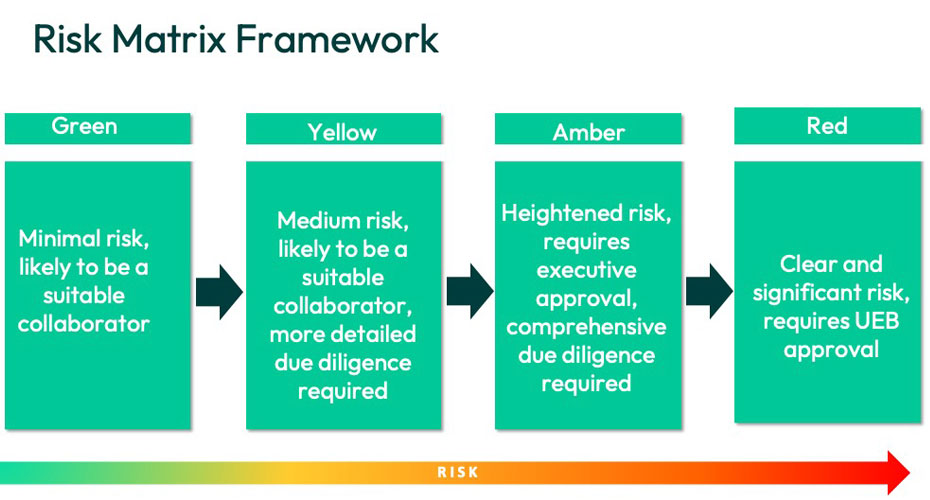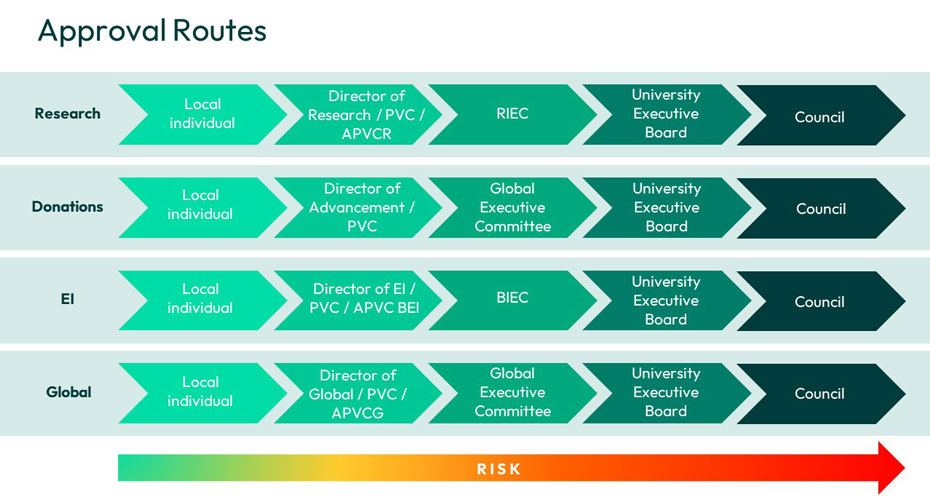Our Partnership Principles
Introduction
The University collaborates with a wide range of partners both across our region and across the world. These partnerships are vital to delivering our Strategy 2030. They enhance our education, research, training, data, knowledge exchange and student experience, while bringing the benefits of our expertise to industry and society.
Our Partnership Principles have been developed to guide our decisions on the agreement of any new partnerships that we enter into.
This will ensure that our partnerships align with our core values and the goals of Strategy 2030, ensuring they reflect our commitment to use the power of our education and research to create a sustainable, healthy and socially just future.
What partnerships does this apply to?
Partnerships covered by the Principles are defined as:
‘a relationship with a third party, involving a formal contractual arrangement which could include the provision of funding or a Memorandum of Understanding (MoU)’.
These could be, for example:
- Partnerships with research funders or research project partners
- Partnerships with donors, including corporate philanthropy
- Partnerships with an industry or commercial funder
- Partners with global higher education institutions
How were they developed?
The Principles were developed by a working group composed of staff from across the University, including representatives from the Senate, the Exeter Students’ Guild and the Falmouth and Exeter Students’ Union.
Who is responsible for assessing partnerships?
Potential partnerships should be raised with the appropriate Professional Services team. These teams will undertake due diligence on any proposed partnership, assess the risk, and seek approval at the appropriate level.
- Partnerships with research funders or research project partners: due diligence would be led by Research Services, with approval by the Research and Impact Committee if required.
- Partnerships with donors, including corporate philanthropy: due diligence would be led by Global Advancement, with approval by the Global Engagement Committee (GEC) if required.
- Partnerships with an industry (broadly defined) or commercial funder: due diligence would be led by Exeter Innovation, with approval by the Business Engagement and Innovation Committee (BEIC) if required. You can raise a request using the due diligence form.
- Partners with global higher education institutions: due diligence would be led by Global Exeter Teams, with approval by the Global Engagement Committee (GEC) if required.
How we assess risk
The University will use a Risk Matrix Framework to assess due diligence risk when considering any proposed partnership. This will use a red, amber, yellow, green (RAYG) scale.
The Due Diligence process assesses a range of legal, regulatory, operational, financial and reputational risks when considering the suitability of a potential partnership. These risks are considered within the context of the proposed activity. They include:
- Legal, governance and ownership structures
- Expertise, credibility and ability to deliver
- Legal and regulatory issues
- Track record and reputation
- Financial health and viability
- Exposure to sanctioned entities, individuals or countries
- Alignment with Exeter’s policies on ethics, EDI (equality, diversity and inclusion), sustainability and other overarching themes from Strategy 2030
- Safety concerns for Exeter personnel
- Impact of legal, political or societal contexts with international partners
- Export, data management and security risk
Different levels of risk will require different levels of approval. You can find more details in the table of Approval Routes.
Working with us
Visit the Exeter Innovation site for more information on how our partnerships with business and organisations power transformative innovation, making a difference to our partners, communities and the world around us. You can also find information on our Global Partnerships site.
FAQs
Most of our partnerships present minimal risk and due diligence is typically completed within a few weeks. Partnerships with elevated levels of risk or complexity may take longer so that appropriate information can be gathered from relevant stakeholders, and risk assessments can be escalated to the required level for decisions.
Please contact ucs@exeter.ac.uk in the first instance.
Academic colleagues looking to set up a potential Business Engagement and Innovation (BEI) partnership should visit the Ideas Hub. If you’re looking for more information on due diligence on a BEI partnership, please email the Due Diligence team.
For global partnerships please email the Global Partnerships team.
The Principles apply to any relationship with a third party involving a formal contractual arrangement.
The partnership principles apply to new partnerships and the renewal of existing partnerships from the date of publication. Existing partnerships and due diligence will reviewed every 3 years. Any concerns can be raised with the relevant contact.
The Principles apply to new partnerships and the renewal of existing partnerships from the date of publication.
University Corporate Services will carry out an annual assessment of the Partnership Principles and due diligence. A summary of results will be reported to the Compliance Committee (a committee of the University Executive Board) and Audit and Risk Committee (a committee of Council).
While the Partnership Principles do not reference specific sectors, our due diligence guidance states that entities in certain sectors will be subject to enhanced legal, regulatory and reputational considerations. These sectors include fossil fuel extraction, pharmaceuticals, military/defence, alcohol, gambling and tobacco.
The Partnership Principles emphasise the proposed activity with the partner, rather than the partner itself. The aim is to ensure that any partnership activities are aligned to the University’s purpose, vision and values, and with the United Nations Sustainable Development Goals. This helps to engage partners from across sectors in activities that will lead to a greener, fairer and healthier future.


